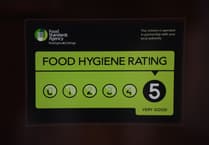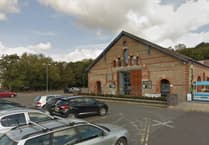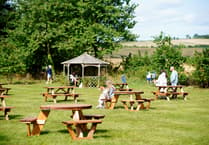Addie Schwartz won with her Fittonia ‘Bubble Plant’ and was presented with the challenge cup by Chairperson Judith Stanford (pictured).
Bees are found all over the world. There are twenty four species of Bumble Bees, two hundred and twenty five species of Solitary Bees and just a single species of Honey Bee.
Wild bees will establish a new colony each year. It is only the Queen who hibernates and finds the spring nectar and pollen to start a new colony, this thrives through the summer but only the new queen will overwinter.
Solitary bees adapt to living in many places. Leafcutters in trees, miners in holes and masonry bees create mud nests.
Honey Bees are a ‘super organism’ dependent on their colony and live in trees and hives where they are at the mercy of the viruses carried by the Varroa Mite.
There has been 78% loss of bees in the last twenty four years. Their food sources have declined with the loss of hedgerows and the loss of 97% of the wildflower meadows. They are adversely affected by the deadly neonicotinoids used by farmers, banned but allowed under tight regulation to save sugar beet crops. These chemicals affect bee’s brains so they cannot find their way to their hive. Common chemicals used by gardeners are also harmful to bees. The large chemical companies have a powerful lobby both here and in the US Farmers are advised by agronomists paid by these companies.
Crops have a higher yield of better-quality fruit when pollinated by bees. It is sad to hear of the imported bees, that cannot be released, who are destroyed when they have finished their work in large greenhouses because of their potential to spread disease.
We should all buy local honey where possible and only from as far away as the EU to prevent import of bee diseases. In China bees have disease but it is controlled by chemicals. The honey is heavily processed to remove the pollen so the origin is disguised and mixed with cheap honey from all over the world. This honey can carry and transmit disease to bees.
As gardeners we should try to create an oasis for bees, providing water and planting native flowers, avoiding doubles and sterile hybrids to provide pollen and nectar, with a variety of species blooming throughout the year. The spring is a particularly important time for the bees to have pollen and nectar rich plants available.
Next meeting will be on Wednesday, 10th August 7.30pm Kilmersdon Village Hall – Carrie Packenham – ‘The cultivation and growing of unusual herbs’, see website for further details: www.kilmersdongardeners.org
Trisha Jordan




Comments
This article has no comments yet. Be the first to leave a comment.